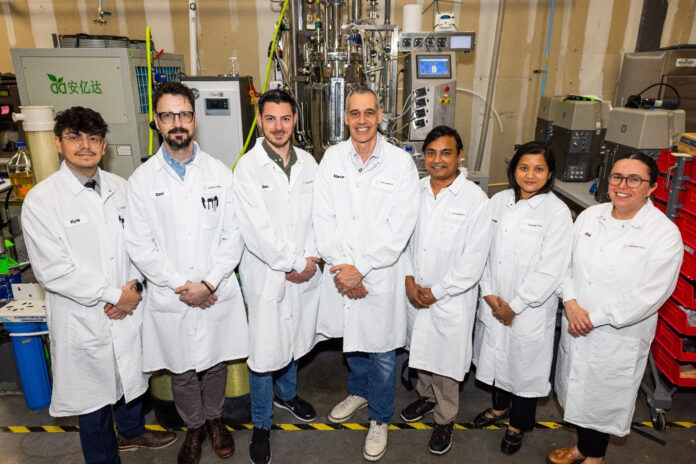Houston — Cemvita, a leading industrial biotechnology company focused on building a circular bioeconomy, announced key advancements this week that accelerate the path toward a final investment decision (FID) for its first commercial plant in Brazil. The company reported two major scientific and technical milestones in the development of its FermOil™ and FermNPK™ products, reinforcing its mission to transform industrial waste into high-value, sustainable outputs.
Cemvita’s FermOil™, a low-carbon feedstock for sustainable aviation fuel (SAF), has seen a significant boost in productivity through its proprietary microbial bioprocessing technology. The achievement came ahead of schedule, with the company successfully optimizing production using crude glycerol—a waste byproduct from the biodiesel industry. This breakthrough improves the economic viability and scalability of FermWorks™, Cemvita’s commercial biomanufacturing facility.
“This productivity milestone is a big part of how we continue to make industrial biotech cheaper and faster,” said Moji Karimi, CEO and cofounder of Cemvita. “I’m incredibly proud of our team for exceeding expectations and proving that biomanufacturing can deliver transformative results.”
At the same time, third-party test results for FermNPK™, a soil bio-stimulant co-product, demonstrated exceptional benefits for soil health and regeneration. In addition to containing core macronutrients like nitrogen, phosphorus, and potassium, FermNPK™ offers a rich blend of micronutrients and organic compounds that nourish the soil microbiome and support biodiversity. This positions the product as a powerful tool for regenerative agriculture, particularly in high-value organic farming and efforts to restore degraded or desertified land.
FermNPK™ is designed not only to replace synthetic fertilizers but to enhance the resilience of agricultural ecosystems. Its nutrient-rich formula includes carbohydrates and proteins that stimulate microbial activity in soil, which is essential for maintaining healthy, living landscapes. According to Cemvita, this aligns with the company’s broader environmental mission to address sustainability challenges beyond carbon emissions—including land degradation, water scarcity, and biodiversity loss.
“Every carbon atom we feed into our process is converted into valuable green chemicals,” said Marcio Silva, Cemvita’s Chief Technology Officer. “Whether it’s SAF, fertilizers, or chemical building blocks, our platform creates real value from waste—and that’s the foundation of a true circular bioeconomy.”
FermOil™, derived from non-edible industrial byproducts, avoids the need for arable land and freshwater—two critical constraints in sustainable fuel production. As a result, it’s well positioned to qualify for SAF tax credits and other sustainability-linked incentives globally, including participation in carbon markets and nature-based finance mechanisms.
Tara Karimi, Cemvita’s Chief Science and Sustainability Officer, emphasized the holistic approach behind the company’s product development. “At Cemvita, sustainability means more than reducing carbon,” she said. “We design products to regenerate ecosystems—from the microbes we engineer to the impact we have on land, water, and biodiversity.”
The progress in both FermOil™ and FermNPK™ significantly derisks the FermWorks™ project and sets the stage for commercial deployment. With support from strategic partners in energy, agriculture, and finance, Cemvita is rapidly emerging as a pioneer in next-generation biomanufacturing—turning waste into economic and environmental value.


